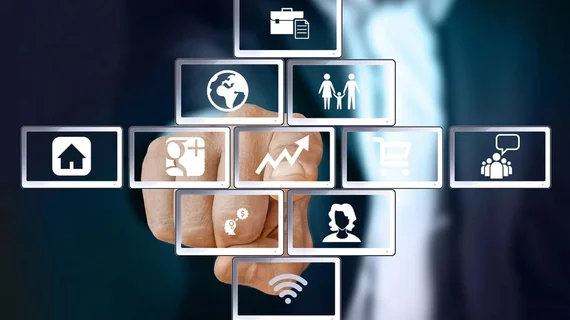COVID crisis prompts call for more telehealth powered by AI and assisted by robots
An international group of scientists and clinicians is calling on health systems to fight COVID-19 and future public health crises by integrating AI and robotics within a care-delivery framework emphasizing telemedicine.
Neuroradiologist Sonu Bhaskar, MD, PhD, of Australia and colleagues outline their vision in a paper published this month in Frontiers in Public Health.
The authors make their case by breaking it into three sections:
1. AI-assisted telemedicine. Bhaskar and colleagues note that, in a telemedicine framework, machine learning can help find optimal diagnostic protocols based on large datasets of affected populations.
“Unlike traditional statistical hypothesis testing, data-driven computational approaches can test for synergistic variable combinations and redundant feature elimination enabling more effective diagnosis under the specific constraints of telemedicine,” they write. “AI exhibits clear advantages over humans in analytical reasoning and problem solving and can effectively address the limitations of human function.”
At the same time, the authors acknowledge several variables that would demand ongoing human supervision. Any effort to give AI a pivotal role in care delivery must take into account, for example, the potential loss of vital physician skills if AI is overutilized.
2. Robotics-assisted telemedicine. The authors see a key role for robotics in minimizing virus exposure during outbreaks. Machines can help deliver drugs and food, monitor vital signs and automatically disinfect areas, for example.
Further, “telepresence robots allow for two-way communication and can be remotely controlled to provide support to those in isolation by connecting patients with family and physicians,” they write. “Facilitating the integration of engineering, video technology and infectious diseases specialists with government funding can have a notable impact on preventing future pandemics.”
3. Telemedicine organizational frameworks. The traditional hub-and-spokes setup for managing systems might work well for launching telehealth-based care but its centralization would probably slow decision-making and depress innovation as the system matures, the authors postulate.
“Centralized systems require strong leadership; otherwise, issues such as lack of efficiency, productivity and physician well-being may develop,” they write. Meanwhile decentralized systems “can slow down the speed of uptake and pose inefficiency. … There also exists a holistic model, in which there is no hierarchy. Each element in the holistic structure is guided by the overarching vision of the organization.”
Bhaskar and co-authors wrap their discussion with a restatement of their major premise: AI and robotics could play an important role in providing telemedicine services during an outbreak or public health emergency while limiting exposure to healthcare workers and health systems.
“The AI-assisted telemedicine framework proposed by the current consortium could be an enabler in improving telemedicine access and spread across medical specialties and geography,” they conclude. “An international collaborative effort led by WHO, the current consortium or similar organizations could pave a way to greater telemedicine penetration, especially to benefit the underprivileged and those living in the low-resourced settings.”
The paper is posted in full for free.

